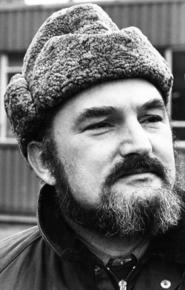Philip Oakes Critic, novelist and poet with a gentle sense of observation of ordinary life
Philip Purser
Tuesday December 20 2005
The Guardian
Philip Oakes, who has died of a heart attack at the age of 77, was once playfully categorised as "poet and court reporter". This was, in fact, a neat summary of a 60-year career that encompassed journalism at every level, as well as poetry, memoirs, fiction and forays into broadcasting, filmmaking and the world of jazz.I first heard tell of him in the early 1950s, but we did not meet until 1957, sneaking guiltily out of some interminable verse drama at the Edinburgh Festival. Friendships were forged, and never faded.He was born at Burslem, in the Potteries. His father was a travelling salesman, his mother a teacher - "education raged through my family like strong drink," he would write. Both were staunch Methodists. But his father died when Philip was only four, and his mother developed a brain tumour, which, despite surgery, soon incapacitated her; so, at the age of eight, he was sent away to the Royal Orphanage school in Wolverhampton. Its headteacher, Oakes liked to recall, augmented his day job with club turns and radio bookings as the Midlands Baritone. Unfortunately, Philip fell foul of him and was expelled.He was sent next to the Methodist Homes in rural Lancashire, a scatter of small houses around a farm, each run by a young house-mother. While most of the pupils learned practical trades, Philip went daily to the local grammar school. At 16, complete with school certificate, he left for London and the traditional start in journalism, as a copy boy. What he did not know was that in the course of some tender consolation from his house-mother, he had impregnated her. Years later, they met again, and Oakes became firm friends both with her and with Jo, the daughter of that brief union.As the second world war was reaching its end, Oakes was called up for military service, sent to the Middle East and eventually coopted on to the staff of a troops newspaper published in Athens. On demobilisation, he resumed his career in London, working at first for a news agency that covered the police courts. Speed and getting the names right counted for more than literary skills, but out of court he was fast making a name as a poet with contributions to reviews and small magazines. He went on to publish half a dozen novels, three matchless volumes of autobiography and three collections of verse.His journalistic career was also soon on the up and up. He was one of the young lions - along with Bernard Levin and Alan Brien - on the political weekly Truth. In ensuing years, he worked for the Evening Standard, was film critic of the Sunday Telegraph and filled a variety of functions at the Sunday Times, including the Atticus gossip column.For ABC Television, he helped devise and produce The Sunday Break, a programme aimed at teenagers, and which inspired his novel The God Botherers. Another programme, Zoo Time, for Granada, led to a long collaboration and friendship with Desmond Morris. On the radio, he was a regular guest on Robert Robinson's Stop the Week. And an acquaintance with Tony Hancock, struck up when they lived in the same corner of Surrey, resulted in Oakes being asked to furnish the story and screenplay of the comedian's second feature film, The Punch and Judy Man.Philip and his first wife Stella had a daughter, Susan, and a son, Toby. Another child died in infancy. They set up wonderfully hospitable homes, latterly in Kent. The marriage seemed so solid that when they gradually drew apart - he to live in London, she to settle on the Welsh borders - their many friends were puzzled. Finally, they were divorced and Philip married Gilly Hodson, a film publicist. By this time London had staled for him, and he settled in Gilly's native Lincolnshire, tended the garden and reviewed crime fiction for the Literary Review.To every subject he wrote on - the cinema, wildlife or, in his poems, love, marriage and jogging along together - he brought burning enthusiasm. He is survived by Gilly and his children.
Philip Barlow Oakes, poet and writer, born January 31 1928; died December 18 2005
Subscribe to:
Post Comments (Atom)

No comments:
Post a Comment